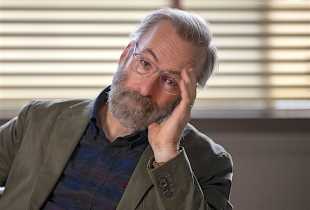Surprised to see Bob Odenkirk starring in a new TV series just seven months after Better Call Saul ended? Yeah, he is, too.
“I said yes to the show, but I thought I’d have a break!” Odenkirk tells TVLine with a laugh. He’s referring to AMC’s new dramedy Lucky Hank, premiering this Sunday at 9/8c and starring him as Hank Devereaux, the grumpy and disgruntled chairman of the English department at a small Pennsylvania college. Odenkirk first read the pilot script written by Aaron Zelman (Damages) and Paul Lieberstein (The Office) — and the Richard Russo novel it’s based on, Straight Man — while he was shooting the final season of Saul two years ago. “I just thought vibe-wise, this was so totally different from Saul, so I said yes to it,” he recalls. “But again, figuring it’ll be a year or two after Saul that we’ll do this, and then they were just like, ‘Let’s make it right away. How fast can you grow a beard?’”
 So what was it about playing Hank that appealed to Odenkirk? “I like that he’s more my age” compared to Saul‘s Jimmy McGill/Saul Goodman, the actor says. “I like that he jokes around and he knows he’s making jokes. Saul would be funny, but you’d laugh at him. And he wasn’t as self-aware as Hank. Hank is extremely self-aware. Cripplingly self-aware. Like most of us!” Odenkirk admits that Saul’s lack of self-awareness “was the hardest thing to play over time. It’s not hard to play in a scene, but over the years of playing someone, for them to take so long to develop any self-awareness, that was challenging, I felt. Hank is very self-aware. And yet he has shortcomings that he doesn’t want to look at. He knows they’re there. He just doesn’t want to look at them.”
So what was it about playing Hank that appealed to Odenkirk? “I like that he’s more my age” compared to Saul‘s Jimmy McGill/Saul Goodman, the actor says. “I like that he jokes around and he knows he’s making jokes. Saul would be funny, but you’d laugh at him. And he wasn’t as self-aware as Hank. Hank is extremely self-aware. Cripplingly self-aware. Like most of us!” Odenkirk admits that Saul’s lack of self-awareness “was the hardest thing to play over time. It’s not hard to play in a scene, but over the years of playing someone, for them to take so long to develop any self-awareness, that was challenging, I felt. Hank is very self-aware. And yet he has shortcomings that he doesn’t want to look at. He knows they’re there. He just doesn’t want to look at them.”
Lucky Hank strikes an even balance between comedy and drama as Hank grapples with a crushing midlife crisis and a nagging feeling of discontent — a balance that not many shows attempt, according to Odenkirk: “It’s 51 percent comedy, 49 percent drama… and that is f–king hard to do. Usually, if you’re doing a comedy, it’s between 70 and 80 or 90 percent comedy. And if you’re doing a drama, it’s the same the other way, it’s 80, 90 percent drama and 10 percent comedy. And to go right here and just like put it right in the middle, it’s just f–king hard to get it right.”
 Haunted by his own lack of literary success — he wrote one novel years ago that landed with a thud and has never attempted a second — Hank takes out his frustrations with his life on his wife Lily (The Killing‘s Mireille Enos), his creative writing students, his fellow professors and just about anyone else in his path. But Odenkirk won’t label him a cynic: “He is an idealist. And that’s why he’s cynical, because every morning he wakes up, and he is disappointed by the world around him. And he tries to get ahead of that by saying all these cynical things. He’s heartbroken every day by the world being as it is.”
Haunted by his own lack of literary success — he wrote one novel years ago that landed with a thud and has never attempted a second — Hank takes out his frustrations with his life on his wife Lily (The Killing‘s Mireille Enos), his creative writing students, his fellow professors and just about anyone else in his path. But Odenkirk won’t label him a cynic: “He is an idealist. And that’s why he’s cynical, because every morning he wakes up, and he is disappointed by the world around him. And he tries to get ahead of that by saying all these cynical things. He’s heartbroken every day by the world being as it is.”
In Lucky Hank‘s opening scene, Hank unloads on a student with a blistering critique of his work and his school that quickly goes viral. Odenkirk points to the news that Hank’s esteemed professor father is retiring as the underlying reason for Hank’s meltdown. It “absolutely provokes him,” he notes, because it says to Hank: “Here comes another chapter of life. It’s starting now. My father is going to be in his final days, and that means I’m next in line.” Hank and his father are badly estranged, but his retirement still rocks Hank to his core, Odenkirk observes: “When people’s reference points, even things they hate, go away, they’re unmoored. And in this opening scene, you see this guy coming unmoored.”
Will you be enrolling in Bob Odenkirk’s new series Lucky Hank? Let us know in the comments.
Source: Read Full Article

